上海版牛津英语六年级(上、下)全重点知识点汇总--最新版
- 格式:doc
- 大小:74.50 KB
- 文档页数:10
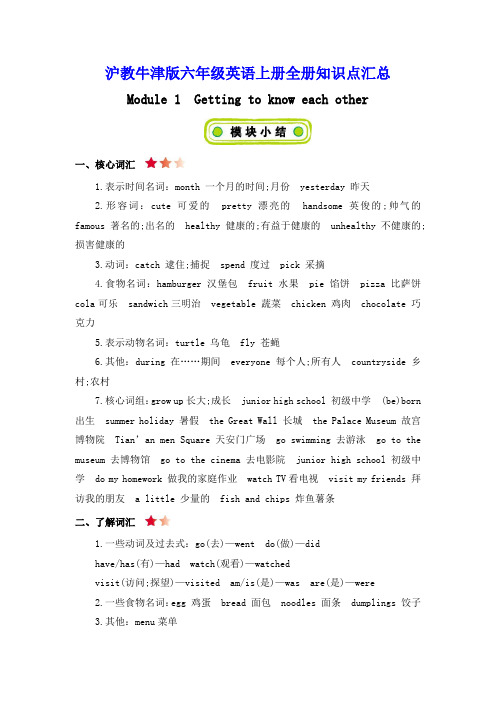
沪教牛津版六年级英语上册全册知识点汇总Module 1 Getting to know each other一、核心词汇1.表示时间名词:month 一个月的时间;月份yesterday 昨天2.形容词:cute 可爱的pretty 漂亮的handsome 英俊的;帅气的famous 著名的;出名的healthy 健康的;有益于健康的unhealthy 不健康的;损害健康的3.动词:catch 逮住;捕捉spend 度过pick 采摘4.食物名词:hamburger 汉堡包fruit 水果pie 馅饼pizza 比萨饼cola可乐sandwich三明治vegetable 蔬菜chicken 鸡肉chocolate 巧克力5.表示动物名词:turtle 乌龟fly 苍蝇6.其他:during 在……期间everyone 每个人;所有人countryside 乡村;农村7.核心词组:grow up长大;成长junior high school 初级中学(be)born 出生summer holiday 暑假the Great Wall 长城the Palace Museum 故宫博物院Tian’an men Square 天安门广场go swimming 去游泳go to the museum 去博物馆go to the cinema 去电影院junior high school 初级中学do my homework 做我的家庭作业watch TV看电视visit my friends 拜访我的朋友 a little 少量的fish and chips 炸鱼薯条二、了解词汇1.一些动词及过去式:go(去)—went do(做)—didhave/has(有)—had watch(观看)—watchedvisit(访问;探望)—visited am/is(是)—was are(是)—were2.一些食物名词:egg 鸡蛋bread 面包noodles 面条dumplings 饺子3.其他:menu菜单三、核心句型1.Her hair was short and her eyes were big. 她那时头发很短而且眼睛很大。

新沪教牛津版六年级下册小学英语期末复习(全册单元知识点小结)Module Changes and differences一、核心词汇1. 名词kilogram千克;公斤(缩略形式kg)centimetre厘米(缩略形式cm)fan(足球、电影等)迷;爱好者theatre剧院life生活writer作家wish愿望;祝愿mountain山;山脉space太空2. 动词weigh有……重;重drive驾驶carry背;提;拿3. 其他poor贫穷的;差的;次的even甚至4. 短语street cleaner 环卫工人二、拓展词汇1. 名词photographer摄影师film胶卷broom扫帚wife妻子fairy仙子;小精灵PS附言(用于信末)dinosaur恐龙2. 动词sweep扫地3. 形容词fantastic极好的digital数码的4. 副词online在线地;在线的5. 代词themselves他们自己;她们自己;它们自己6. 其他taller更高的7. 短语go fishing去钓鱼enjoy oneself玩得愉快;得到乐趣get … in收割street sweeper扫地车by hand用手right away立即;马上in a short time很快head teacher 校长 a piece of一张;一片have a picnic去野餐better and better越来越好三、核心句型1. I’m 150 centimetres tall. 我身高150厘米。
解读:这是介绍身高的句型。
“主语 + be动词 + 数字 + 长度单位(+ tall).”可以用来介绍某人的身高。
举一反三: My cousin is 154 centimetres tall. 我的堂弟身高154厘米。
Jim is 149 centimetres tall. 吉姆身高149厘米。
2. There are a lot of tall buildings in the city. 城市里有很多高大的建筑物。
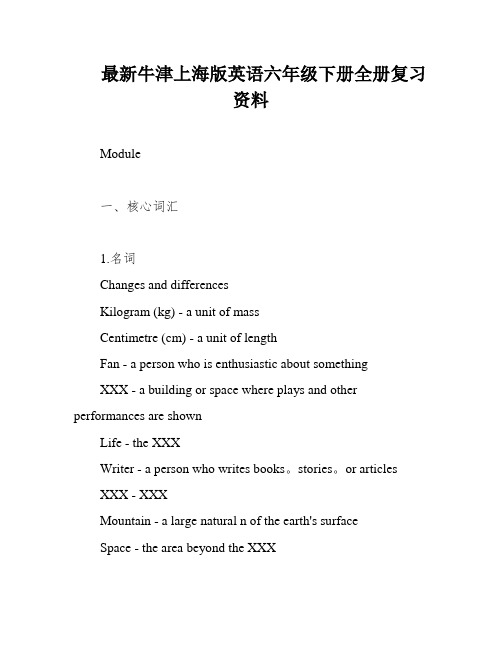
最新牛津上海版英语六年级下册全册复习资料Module一、核心词汇1.名词Changes and differencesKilogram (kg) - a unit of massCentimetre (cm) - a unit of lengthFan - a person who is enthusiastic about somethingXXX - a building or space where plays and other performances are shownLife - the XXXWriter - a person who writes books。
stories。
or articlesXXX - XXXMountain - a large natural n of the earth's surfaceSpace - the area beyond the XXX2.动词Weigh - to determine the weight of somethingDrive - to operate a XXXCarry - to hold or support something while moving3.其他Poor - XXXEven - used to XXX4.短语Street cleaner - a person who cleans the streets二、拓展词汇1.名词Photographer - a person who takes photographsFilm - a XXX flexible strip coated with light-sensitive XXX Broom - a long-XXX sweepingWife - a married womanFairy - XXXPS - postscript。
a note added to the end of a letter after the signatureDinosaur - XXX years ago2.动词Sweep - to clean a surface using a broom3.形容词- extremely goodDigital - XXX4.副词Online - connected to the。
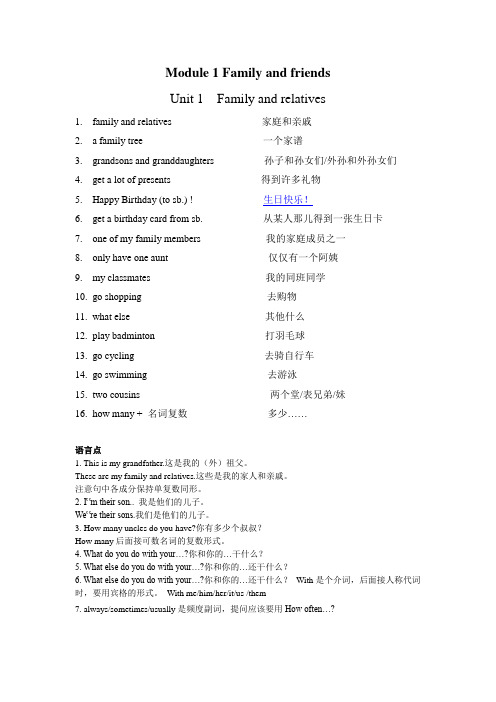
Module 1 Family and friendsUnit 1 Family and relatives1.family and relatives 家庭和亲戚2. a family tree 一个家谱3.grandsons and granddaughters 孙子和孙女们/外孙和外孙女们4.get a lot of presents 得到许多礼物5.Happy Birthday (to sb.) ! 生日快乐!6.get a birthday card from sb. 从某人那儿得到一张生日卡7.one of my family members 我的家庭成员之一8.only have one aunt 仅仅有一个阿姨9.my classmates 我的同班同学10.go shopping 去购物11.what else 其他什么12.play badminton 打羽毛球13.go cycling 去骑自行车14.go swimming 去游泳15.two cousins 两个堂/表兄弟/妹16.how many + 名词复数多少……语言点1. This is my grandfather.这是我的(外)祖父。
These are my family and relatives.这些是我的家人和亲戚。
注意句中各成分保持单复数同形。
2. I‟m their son.. 我是他们的儿子。
We‟re their sons.我们是他们的儿子。
3. How many uncles do you have?你有多少个叔叔?How many后面接可数名词的复数形式。
4. What do you do with your…?你和你的…干什么?5. What else do you do with your…?你和你的…还干什么?6. What else do you do with your…?你和你的…还干什么?With是个介词,后面接人称代词时,要用宾格的形式。
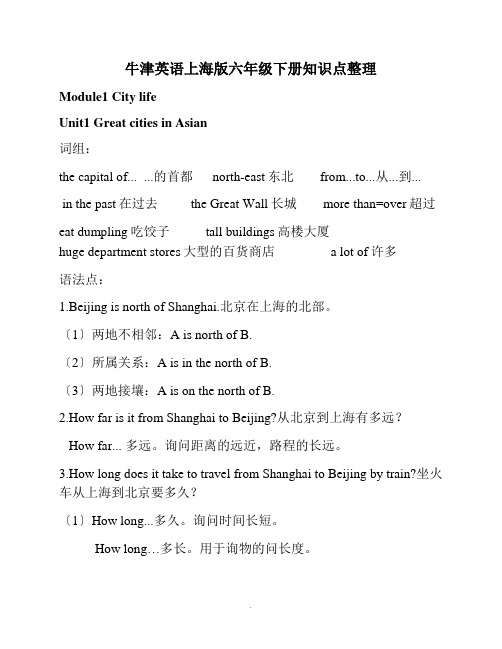
牛津英语上海版六年级下册知识点整理Module1 City lifeUnit1 Great cities in Asian词组:the capital of... ...的首都 north-east东北 from...to...从...到...in the past在过去 the Great Wall长城 more than=over超过eat dumpling吃饺子 tall buildings高楼大厦huge department stores大型的百货商店 a lot of许多语法点:1.Beijing is north of Shanghai.北京在上海的北部。
〔1〕两地不相邻:A is north of B.〔2〕所属关系:A is in the north of B.〔3〕两地接壤:A is on the north of B.2.How far is it from Shanghai to Beijing?从北京到上海有多远?How far... 多远。
询问距离的远近,路程的长远。
3.How long does it take to travel from Shanghai to Beijing by train?坐火车从上海到北京要多久?〔1〕How long...多久。
询问时间长短。
How long…多长。
用于询物的问长度。
〔2〕by+交通工具,表示“乘...交通工具〞,用How提问。
4.It takes about ten hours.大约需要十小时It takes (sb.) st. to do sth. 做某事需要花费多长时间。
5.They enjoy eating dumplings.他们喜欢吃饺子enjoy/like/love doing sth. 喜欢做某事6.Two and a half days=Two days and a half两天半Half an hour=one and a half hours=one/an hour and a half一个半小时Unit2 At the airport词组:plane ticket机票 silk scarf丝巾 a lot of/plenty of大量的,许多departure time出发时间 leave for出发去某地 have to不得不be going to将要 arrive at到达boarding card登机牌 name tap姓名语法点:1.Aunt Judy and Uncle Mike have lived in Los Angeles for six years.朱迪婶婶和迈克叔叔在洛杉矶已住了六年。
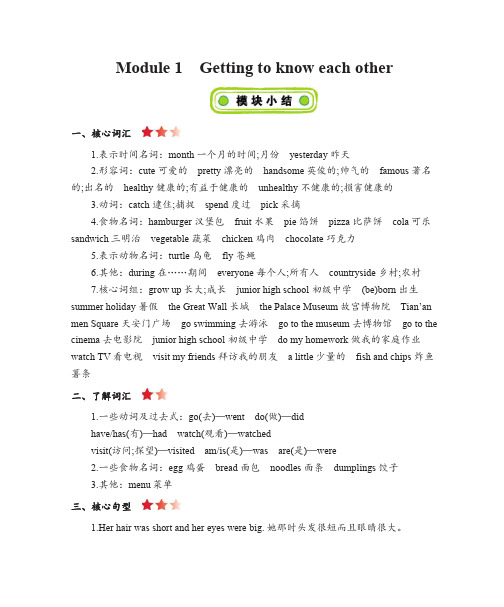
Module1Getting to know each other一、核心词汇1.表示时间名词:month一个月的时间;月份yesterday昨天2.形容词:cute可爱的pretty漂亮的handsome英俊的;帅气的famous著名的;出名的healthy健康的;有益于健康的unhealthy不健康的;损害健康的3.动词:catch逮住;捕捉spend度过pick采摘4.食物名词:hamburger汉堡包fruit水果pie馅饼pizza比萨饼cola可乐sandwich三明治vegetable蔬菜chicken鸡肉chocolate巧克力5.表示动物名词:turtle乌龟fly苍蝇6.其他:during在……期间everyone每个人;所有人countryside乡村;农村7.核心词组:grow up长大;成长junior high school初级中学(be)born出生summer holiday暑假the Great Wall长城the Palace Museum故宫博物院Tian’an men Square天安门广场go swimming去游泳go to the museum去博物馆go to the cinema去电影院junior high school初级中学do my homework做我的家庭作业watch TV看电视visit my friends拜访我的朋友a little少量的fish and chips炸鱼薯条二、了解词汇1.一些动词及过去式:go(去)—went do(做)—didhave/has(有)—had watch(观看)—watchedvisit(访问;探望)—visited am/is(是)—was are(是)—were2.一些食物名词:egg鸡蛋bread面包noodles面条dumplings饺子3.其他:menu菜单三、核心句型1.Her hair was short and her eyes were big.她那时头发很短而且眼睛很大。
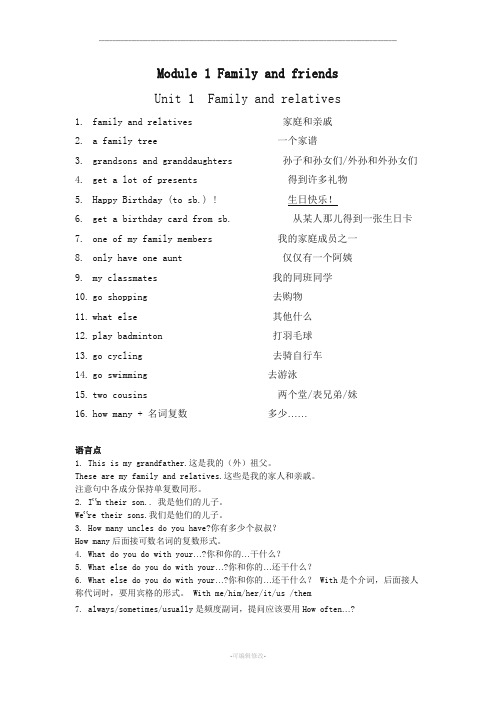
Module 1 Family and friendsUnit 1 Family and relatives1.family and relatives 家庭和亲戚2. a family tree 一个家谱3.grandsons and granddaughters 孙子和孙女们/外孙和外孙女们4.get a lot of presents 得到许多礼物5.Happy Birthday (to sb.) ! 生日快乐!6.get a birthday card from sb. 从某人那儿得到一张生日卡7.one of my family members 我的家庭成员之一8.only have one aunt 仅仅有一个阿姨9.my classmates 我的同班同学10.go shopping 去购物11.what else 其他什么12.play badminton 打羽毛球13.go cycling 去骑自行车14.go swimming 去游泳15.two cousins 两个堂/表兄弟/妹16.how many + 名词复数多少……语言点1. This is my grandfather.这是我的(外)祖父。
These are my family and relatives.这些是我的家人和亲戚。
注意句中各成分保持单复数同形。
2. I‟m their son.. 我是他们的儿子。
We‟re their sons.我们是他们的儿子。
3. How many uncles do you have?你有多少个叔叔?How many后面接可数名词的复数形式。
4. What do you do with your…?你和你的…干什么?5. What else do you do with your…?你和你的…还干什么?6. What else do you do with your…?你和你的…还干什么?With是个介词,后面接人称代词时,要用宾格的形式。
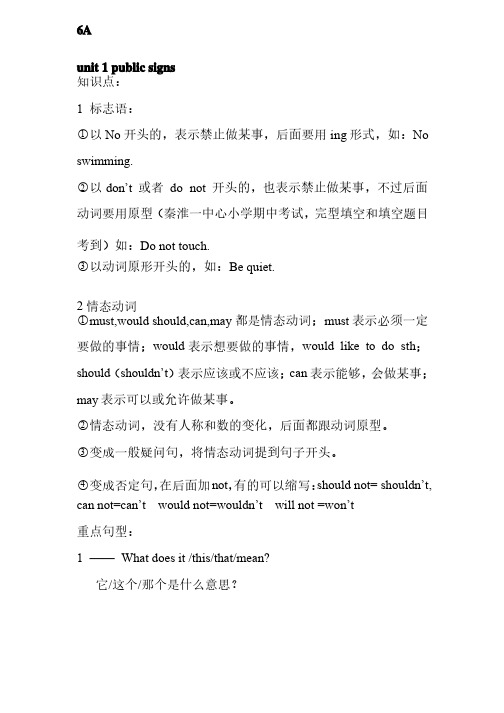
6Aunit 1 public signs知识点:知识点:1 标志语:标志语:○1以No 开头的,表示禁止做某事,后面要用ing 形式,如:No swimming.○2以don don’’t 或者或者do not 开头的,也表示禁止做某事,不过后面动词要用原型(秦淮一中心小学期中考试,完型填空和填空题目考到)如:Do not touch.○3以动词原形开头的,如:Be quiet. 2情态动词情态动词○1must,would should,can,may 都是情态动词;must 表示必须一定要做的事情;would 表示想要做的事情,would like to do sth ;should (shouldn shouldn’’t )表示应该或不应该;can 表示能够,会做某事;may 表示可以或允许做某事。
表示可以或允许做某事。
○2情态动词,没有人称和数的变化,后面都跟动词原型。
情态动词,没有人称和数的变化,后面都跟动词原型。
○3变成一般疑问句,将情态动词提到句子开头。
变成一般疑问句,将情态动词提到句子开头。
○4变成否定句,在后面加not ,有的可以缩写:should not= shouldn should not= shouldn’’t, can not=can can not=can’’t would not=wouldn would not=wouldn’’t will not =won will not =won’’t重点句型:重点句型:1 ————What does it /this/that/mean? 它/这个/那个是什么意思?那个是什么意思?It means you /wemust/should/shoudn It means you /wemust/should/shoudn’’t..意思是你/我们必须/应当/不应该。
解析:解析:当你不知道一个标志、一个词语或者一句话的意思时,可以用这句话来询问。
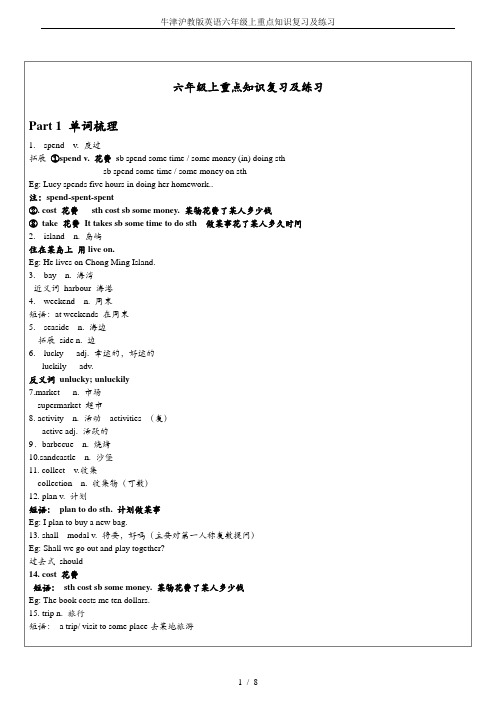
2. “Instead of helping you, your own language gets in your way.”This sentence means that memorizing your own language can ________.A.help you to study English wellB.stop you mastering EnglishC.make English easy to learnD.help you notice mistakes3.Equally important is to feel the language. “to feel the language” here means________.A.to get a knowledge of English by touchingB.to be able to read and write EnglishC.to translate English into your own by imaginingD.to be able to experience the rich sensation of the languageBWhen we can see well, we do not think about our eyes often. It is only when we can not see perfectly that we come to see how important our eyes are.People who are nearsighted can only see things that are very close to their eyes. Many people who do a lot of close work, such as writing and reading, become nearsighted. Then they have to wear glasses in order to see distant things clearly. People who are farsighted face just the opposite problem. They can see things that are far away, but they have difficulty reading a book unless they hold it at arm’s length. If they want to do much reading, they must get glasses too.Other people do not see clearly because their eyes are not exactly the right shape. This, too, can be corrected by glasses. Some people’s eyes become cloudy because of cataracts. Long ago these people often became blind. Now, however, it is possible to operate on the cataracts and remove them.When night falls, colors become fainter to the eyes and finally disappear. After your eyes have grown used to the dark, you can see better if you use the side of your eyes rather than the centers. Sometimes, after dark, you see a small thing to one side of you, which seems to disappear if you turn your head in its direction. This is because when you turn your head, you are looking at the thing too directly. Men on guard duty sometimes think they see something moving to one side of them. When they turn to look straight at it, they can not see it any more, and they believe they were mistaken. However, this mistake happens because the center of the eye, which is very sensitive in daylight, is not as sensitive as the sides of the eye after dark.4.We don’t know that our eyes are of great importance until ________.A. we think about our eyesB. we cannot see clearlyC. we wear glassesD. we have to do much reading5.According to the passage, a ________ is more likely to be nearsighted.A.tailorB. doctorC. guardD.painter6.People who are farsighted ________ .A.cannot do a lot of close work without glassesB.can only see things that are very close to their eyesC.have difficult y reading a book if they hold it at arm’s lengthD.have the same problem as the nearsighted people7.To see a small thing at night, it is better to look ________ .A.with wide open eyesB.with half shut or narrowed eyesC.straight at itD.in a slightly different directionC Read and answer the questions.Children from all over the word like to celebrate (庆祝) their birthdays. American children are of no difference. American children usually celebrate with a party. They invite their friends to join the party. The party may not be held on the exact date of birthday if it comes to a school day. It may be held on the closest weekend instead.Today two kinds of parties are the most popular. One is held at home. Parents make their house beautiful with balloons and coloured paper. They prepare a special birthday meal. The children play games. The other one is held away from home. Some are at a special restaurant. The children eat pizza and ice cream. The waiters, who serve the food, also sing and tell jokes to the children. Other parties may be held at a park, a movie theatre or some other places.( ) 2 They are going to the supermarket by bus.( ) 3 The supermarket is not far away from their home.( ) 4 Dick's mother is going to buy a lot of food for the next week.( ) 5 Dick is going to buy a video game machine but he can't play it all the time.( ) 6 They are going to stay in the supermarket for 5 hours.Ⅴ.Choose the right answer.It's Sunday. Mother, father and the children are going to the beach.Alice: Where are we going, Dad?Father. Let's look at the map. Let me see. We will go to the East Point Beach.Mother: We'll swim in the sea.David: Are we going to have a picnic?Alice: Yes, of course.David: That's nice.Father: Come on! Let's all get in the car!Alice: What's wrong (怎么了), Dad?Father: The car can't start (发动)!Mother: So we will all stay at home.Alice: Let's have a picnic in the garden!David: Great!( )1 The family is going to ____________ .A. swim in the seaB. have a picnicC. swim and have a picnic( )2 They are going there ____________ .A. by busB. by carC. by underground( )3 They won't go to the beach ______________ .A. because it is rainyB. because Father is not fineC. because the car doesn't start( ) 4 They will have the picnic _____________ in the end.A. on the beachB. in the gardenC. in the carⅥ.Read the passage and fill in the blanks with proper words.It will be grandfather's s______________ birthday next Sunday. We are going to have a big birthday p____________. Uncles and aunts will buy some p______________for him. But I want to make a nice birthday c______________for grandfather. Mum and Dad are going to buy a lot of food from the s______________.【Keys】I. 1. Tom is speaking Chinese.。

上海牛津英语六年级上下册全知识点梳理频度副词always/sometimes/usually/never 是频度副词,提问应该要用How often…?在句中的位置是:放在行为动词的前面,放在be动词的后面。
也可以说“行前系后”。
E.g She is always kind.她总是很善良的。
She always helps other people.她总是帮助其他人。
不能出现这样的句子:She is always helps other people.(×)一句话中不能同时出现两个动词。
并且要注意主谓保持一致,尤其注意第三人称单数不可以忽略。
how often 与how many timeshow often 提问“频率次数+时间范围”how many times 提问“频率次数”e.g. —How often do you exercise? —Twice a week.—How many times have you been there? —Twice.副词表示动作特征或性状特征。
一般用来形容或修饰除了名词和代词以外的词,主要修饰形容词、动词、其他副词和句子。
He looks very happy.(修饰形容词)The old lady is walking slowly now.(修饰动词)Luckily, he got the first prize.(修饰句子)形容词后面+ly构成副词:slow—slowly slight—slightly quick—quickly careful—carefully fierce—fiercely immediate—immediately gentle—gently lucky—luckily happy—happily介词What else do you do with your…?你和你的…还干什么?With是个介词,后面接人称代词时,要用宾格的形式。
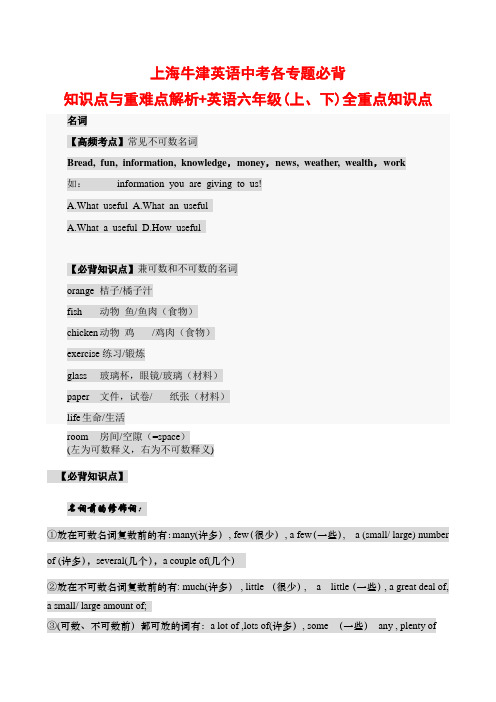
上海牛津英语中考各专题必背知识点与重难点解析+英语六年级(上、下)全重点知识点名词【高频考点】常见不可数名词Bread, fun, information, knowledge,money,news, weather, wealth,work如:_____ information you are giving to us!A.What useful A.What an usefulA.What a useful D.How useful【必背知识点】兼可数和不可数的名词orange 桔子/橘子汁fish 动物鱼/鱼肉(食物)chicken 动物鸡/鸡肉(食物)exercise练习/锻炼glass 玻璃杯,眼镜/玻璃(材料)paper 文件,试卷/ 纸张(材料)life 生命/生活room 房间/空隙(=space)(左为可数释义,右为不可数释义)【必背知识点】名词前的修饰词:①放在可数名词复数前的有:many(许多), few(很少), a few(一些), a (small/ large) number of (许多),several(几个),a couple of(几个)②放在不可数名词复数前的有: much(许多), little (很少), a little(一些), a great deal of,a small/ large amount of;③(可数、不可数前)都可放的词有:a lot of ,lots of(许多), some (一些)any , plenty of区分:a lot 相当于very 表示“很,非常”,后面不能加名词;a lot of表示“很多”,后面加名词。
A number of表示“一些”,the number of 表示“…的数量”,前者谓语用复数,后者谓语用单数。
名词所有格's 表示“某人家”、“店铺”,省略后面的名词eg : at Mr. Green’s, to my uncle’s , at the doctor’s, at the tailor’s冠词【常考易错点】(必须记牢)A useful/ university/ European/one-eyed/+名词;a uniform/ unit/ used caran hour unusual(否定前缀)an + honest/ 8-year-old+名词【难点】冠词a/an在序数词前,表“又一”=anotherHe didn’t give up and took a seventh try.【必背知识点】the在序数词和形容词最高级前。
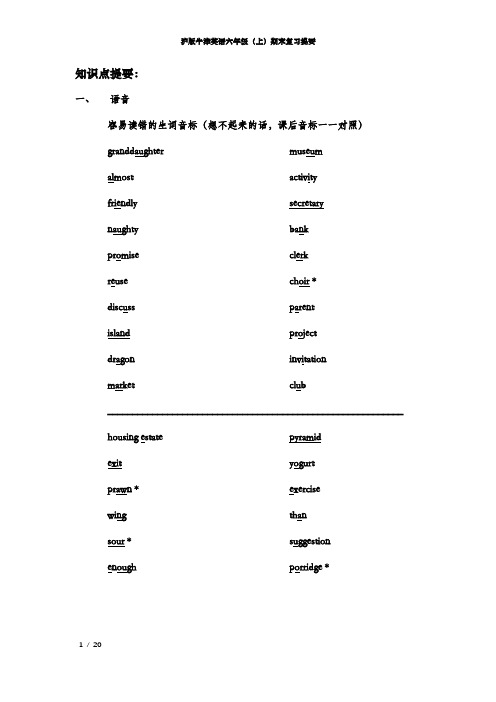
知识点提要:一、语音容易读错的生词音标(想不起来的话,课后音标一一对照)granddaughter almost friendly naughty promise reuse discuss island dragon market museum activity secretary bank clerk choir * parent project invitation club___________________________________________________________housing estate exitprawn * wingsour * enough pyramid yogurt exercise than suggestion porridge *二、词汇与词组1.容易错的单词拼写➢an aunt / an uncle 首字母发音都是元音,所以前面跟的不定冠词用“an”,同理,an hour ago (h不发音,所以用an).➢注意比较:an umbrella vs. a useful book 虽然都是字母U开头,但是因为u的发音不同,所以前面跟的冠词就不一样。
另外,需要特别注意interesting / exciting 这样的元音开头的形容词,它们放在某个单数名词前面做修饰,这时也要用冠词an;但如果在它们前面又加了程度副词v ery / more…则冠词又必须变回a。
比如:a book vs. an interesting book vs. a very interesting book➢the Earth (大写E,且前面必须使用定冠词the, 表示独一无二的事物) ➢Friends of the Earth 表示一个环保组织(属于专有名词),F / E大写。
牛津课本上是把他们看成该组织的所有成员(相当于people),动词用复数;不过,某些习题书上也会把它看成一个组织,动词用单数。
![上海版牛津英语六年级全重点知识点复习整理[资料]-9页文档资料](https://img.taocdn.com/s1/m/9e929fbe680203d8ce2f24a9.png)
上海牛津英语六年级上下册全知识点梳理频度副词always/sometimes/usually/never 是频度副词,提问应该要用How often…?在句中的位置是:放在行为动词的前面,放在be动词的后面。
也可以说“行前系后”。
E.g She is always kind.她总是很善良的。
She always helps other people.她总是帮助其他人。
不能出现这样的句子:She is always helps other people.(×)一句话中不能同时出现两个动词。
并且要注意主谓保持一致,尤其注意第三人称单数不可以忽略。
how often 与how many timeshow often 提问“频率次数+时间范围”how many times 提问“频率次数”e.g. —How often do you exercise? —Twice a week.—How many times have you been there? —Twice.副词表示动作特征或性状特征。
一般用来形容或修饰除了名词和代词以外的词,主要修饰形容词、动词、其他副词和句子。
He looks very happy.(修饰形容词)The old lady is walking slowly now.(修饰动词)Luckily, he got the first prize.(修饰句子)形容词后面+ly构成副词:slow—slowly slight—slightly quick—quickly careful—carefully fierce—fiercely immediate—immediately gentle—gently lucky—luckily happy—happily介词What else do you do with your…?你和你的…还干什么?With是个介词,后面接人称代词时,要用宾格的形式。
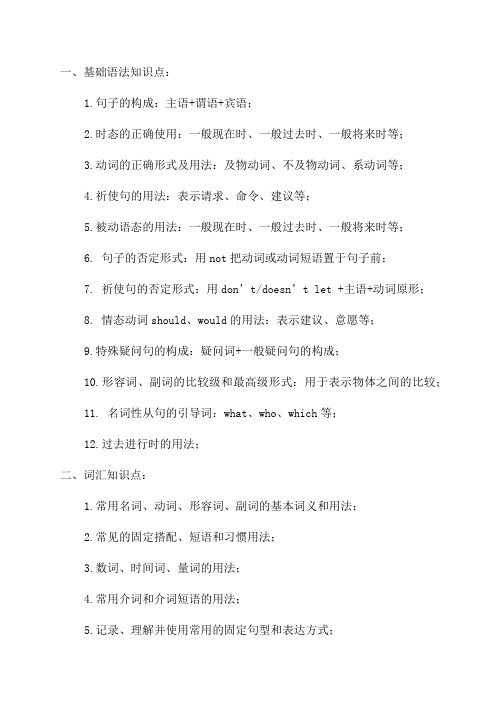
一、基础语法知识点:
1.句子的构成:主语+谓语+宾语;
2.时态的正确使用:一般现在时、一般过去时、一般将来时等;
3.动词的正确形式及用法:及物动词、不及物动词、系动词等;
4.祈使句的用法:表示请求、命令、建议等;
5.被动语态的用法:一般现在时、一般过去时、一般将来时等;
6. 句子的否定形式:用not把动词或动词短语置于句子前;
7. 祈使句的否定形式:用don’t/doesn’t let +主语+动词原形;
8. 情态动词should、would的用法:表示建议、意愿等;
9.特殊疑问句的构成:疑问词+一般疑问句的构成;
10.形容词、副词的比较级和最高级形式:用于表示物体之间的比较;
11. 名词性从句的引导词:what、who、which等;
12.过去进行时的用法;
二、词汇知识点:
1.常用名词、动词、形容词、副词的基本词义和用法;
2.常见的固定搭配、短语和习惯用法;
3.数词、时间词、量词的用法;
4.常用介词和介词短语的用法;
5.记录、理解并使用常用的固定句型和表达方式;
三、阅读技巧:
1.能够理解并提取文本中的关键信息;
2.能够根据文本内容进行推测和判断;
3.能够根据问题选择正确的答案;
4.能够理解并使用上下文线索;
5.能够根据语境理解单词和短语的意思;
四、写作技巧:
1.能够用正确的语法和用词写出简单连贯的句子;
2.能够运用所学的句型和句式进行书面表达;
3.能够用英语写简单的对话、日记、邮件等;
4.能够根据要求写出简单的说明文、记叙文等;。
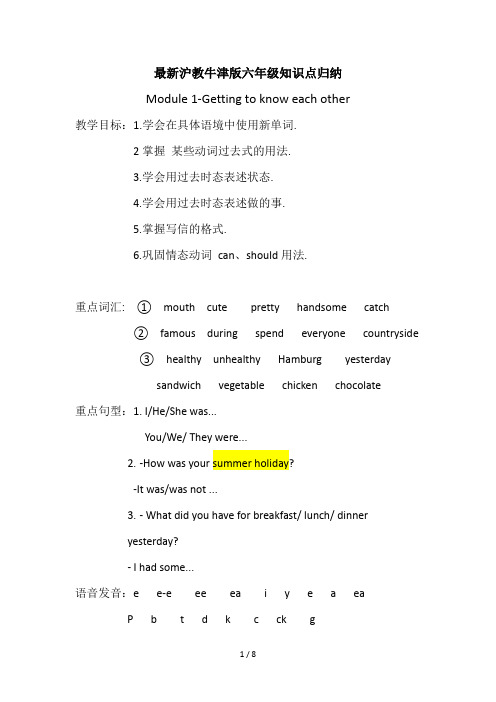
最新沪教牛津版六年级知识点归纳Module 1-Getting to know each other教学目标:1.学会在具体语境中使用新单词.2掌握某些动词过去式的用法.3.学会用过去时态表述状态.4.学会用过去时态表述做的事.5.掌握写信的格式.6.巩固情态动词can、should用法.重点词汇: ①mouth cute pretty handsome catch②famous during spend everyone countryside③healthy unhealthy Hamburg yesterdaysandwich vegetable chicken chocolate重点句型:1. I/He/She was...You/We/ They were...2.-How was your summer holiday?-It was/was not ...3.- What did you have for breakfast/ lunch/ dinneryesterday?- I had some...语音发音:e e-e ee ea i y e a eaP b t d k c ck gModule 2-Relationship教学目标:1.学会在具体语境中使用新单词.2掌握某些动词过去式的用法.3.学会用一般过去时的疑问句.4.巩固wh - questions 在过去语态中的用法.5.掌握数词hundred,thousand的用法.6.巩固Would like to...句型和There be ...句型.重点词汇: ①neighbour son daughter noisy dig② thousand hundred wild way die learn send③e-friend country other hobby重点句型:1. - Did you +动词原形+过去时间?- Yes,I did./ No,I didn’t.2.There was a...in the past.There were many...in the past.3.-Would you like to ...-Yes,I’d like to./No,I wouldn’t.语音发音 a ar u o ue u-e oo uf v thModule 3-Out and about教学目标:1.学会在具体语境中使用新单词.2掌握Shall we...句型.4.掌握What did you+动词原形句型.4.学会用过去时态表述做的事.5.掌握How long does it take to...句型.6.巩固副词修饰动词的用法.重点词汇: ① shall police exciting boring kill asleep② bee insect ant kind finger dancer③capital north east west south tourist building重点句型:1. -What did you 动词原形?- I +动词过去时.2.Shall we +动词原形.3.- How long does it take to get to Shanghai from Beijing by train?-It takes about five hours.语音发音:s z c ts ds or al au oor o a er ir ur or aModule 4-The natural world教学目标:1.学会在具体语境中使用新单词.2.掌握make/keep+sb+adj 用法.3.学会It is +adj+ to+动词原形用法.4.掌握any 和some 用法.5.掌握get...from use...to 用法.6.巩固情态动词should/shouldn’t 用法.7.学会stop + v ing 用法.重点词汇: ①air alive factory smoke fresh plant②wood cool match miss③ Earth part forest land ocean rubbish sick 重点句型:1. It keeps them high in the sky.It makes the place clean.2.We should stop cutting down so many trees.3. We get wood from treesWe use wood to make tables and chairs.语音发音:ch g j sh s tr dr六下Module 1-Change and difference教学目标:1.学会在具体语境中使用新单词.2掌握某些形容词比较级的用法.3.巩固There be... 句型.4.巩固用过去时态表述做的事.5.掌握某些动词转变为“职业”的名词.6.巩固将来时will+动词原形用法.重点词汇: ①weigh kilogram centimetre fan theatre②life writer street cleaner drive poor wish③carry mountain even space重点句型:1. --How tall are you?- I’m ...centimetres tall.2.-How much do you weigh?- I weigh...kilograms.3.I’m taller than...4.I’d like to +动词原形.语音发音:a a-e ai ay eigh i i-e y igh ie o o-e ow ou m n ng n(k)n(g)Module 2-Work and play教学目标:1.学会在具体语境中使用新单词.2.巩固be going to ...句型.3.巩固现在进行时的用法.4.巩固which...选择疑问句的用法.5.掌握情态动词should用法.重点词汇: ① oil brush paints artist unhappycarefully② scissors tape glue tool easily still③ long race short win long jump high jump重点句型:1. - Which one do you like?- I like the one on the left.2.-What do you want to make?- I want to ...3.-What are you making?-I’m making a toy plane.语音发音oy oi ear ere eer air ere ear are ure our oor y h w wh l r rrModule 3-Things we do教学目标:1.学会在具体语境中使用新单词.2.掌握情态动词can/can’t 用法.3.学会用一般过去时的疑问句.4.掌握祈使句和祈使句的否定用法.5.学会不可数名词数量的表示法..6.学会区分also,too.重点词汇: ①praise praise...for bell neck ago② special lost worry may middle sign③ reuse envelope plastic rubber cloth重点句型:1. -How can I...?- You can...2.We must look out for them.3.We shouldn’t smoke in the library.4.Finally,they made us into a piece of cloth.语音发音(音节、单词重读、句子重读)Module 4-Things we enjoy教学目标:1.学会在具体语境中使用新单词.2掌握某些动词过去式的用法.3.学会区分other ,the other,another.4.专有名词开头大写.5.巩固形容词比较级的用法.6.巩固序数词的用法.重点词汇: ①adult well-known scarf blow off take off② western turkey bright laugh at③ pea excited lazy roof yard hit重点句型:1. We can usually learn something from these stories.2.I am stronger than you.3.- What is the story about?- It’s about...4.Christmas is on 25th December.语音发音(音调、连读)。

Module 1 Family and friendsUnit 1 Family and relatives1.family and relatives 家庭和亲戚2. a family tree 一个家谱3.grandsons and granddaughters 孙子和孙女们/外孙和外孙女们4.get a lot of presents 得到许多礼物5.Happy Birthday (to sb.) ! 生日快乐!6.get a birthday card from sb. 从某人那儿得到一张生日卡7.one of my family members 我的家庭成员之一8.only have one aunt 仅仅有一个阿姨9.my classmates 我的同班同学10.go shopping 去购物11.what else 其他什么12.play badminton 打羽毛球13.go cycling 去骑自行车14.go swimming 去游泳15.two cousins 两个堂/表兄弟/妹16.how many + 名词复数多少……语言点1. This is my grandfather.这是我的(外)祖父。
These are my family and relatives.这些是我的家人和亲戚。
注意句中各成分保持单复数同形。
2. I?m their son.. 我是他们的儿子。
We?re their sons.我们是他们的儿子。
3. How many uncles do you have?你有多少个叔叔?How many后面接可数名词的复数形式。
4. What do you do with your…?你和你的…干什么?5. What else do you do with your…?你和你的…还干什么?6. What else do you do with your…?你和你的…还干什么? With是个介词,后面接人称代词时,要用宾格的形式。
上海牛津英语六年级上下册精选知识点汇总集合梳理频度副词always/sometimes/usually/never 是频度副词,提问应该要用How often…?在句中的位置是:放在行为动词的前面,放在be动词的后面。
也可以说“行前系后”。
E.g She is always kind.她总是很善良的。
She always helps other people.她总是帮助其他人。
不能出现这样的句子:She is always helps other people.(×)一句话中不能同时出现两个动词。
并且要注意主谓保持一致,尤其注意第三人称单数不可以忽略。
how often 与how many timeshow often 提问“频率次数+时间范围”how many times 提问“频率次数”e.g. —How often do you exercise? —Twice a week.—How many times have you been there? —Twice.副词表示动作特征或性状特征。
一般用来形容或修饰除了名词和代词以外的词,主要修饰形容词、动词、其他副词和句子。
He looks very happy.(修饰形容词)The old lady is walking slowly now.(修饰动词)Luckily, he got the first prize.(修饰句子)形容词后面+ly构成副词:slow—slowly slight—slightly quick—quickly careful—carefully fierce—fiercely immediate—immediately gentle—gently lucky—luckily happy—happily介词What else do you do with your…?你和你的…还干什么?With是个介词,后面接人称代词时,要用宾格的形式。
With me/him/her/it/us /them 在具体的某一楼层只能用介词on,并且第几层还要用序数词 On the ground floor, on the first floor, on the fifteenth floor具体的某一天介词只能用onOn Sunday, On Sunday morning,On the Open Dayhe one on the left/right 左边/右边的这个 the one in the middle 中间的这个如果是介词短语修饰the one,应该要放在the one后面,如果是形容词应放the one的中间the left/right one the middle oneat weekends= at the weekend在周末现在完成时现在完成时的构成是: have/has +动词的过去分词。
have/has been to 去过,到过(表示现在已经回来)have/has been in 住在= have lived / stayed inhave/has gone to 去,到….. (表示现在还没有回来)e.g. We have already been to Changfeng Park.I have lived in Shanghai for thirteen years.Have you been to …..yet? 你去过…..吗?Yes, I have already/just been to…./been there. 是的,我已经去过了。
No, I haven‟t been to …/been there yet. 不,还没有去过。
already 已经(多用于肯定句,放于动词前)yet 迄今,还(多用于疑问句和否定句,放于句末)just 刚刚(用法和位置和already相同)e.g. I have already been to Lily’s home.Have you been to Lily’s home yet?No, I haven’t been to her home yet.live / stay …for…在…住/待…(时间)for +一段时间,多与现在完成时连用表示动作从过去延续到现在的一段时间,并用how long提问。
代词one 用来指代一个人或事物,而ones用来指代一些人或事物。
定冠词the定冠词the的用法:a. 在球类运动前不加定冠词the play football / basketball / tennis, etc.b. 在乐器前必须加定冠词the play the piano / violin, etc.c. 在watching television中,不加定冠词the时间表达方式on the tenth of September / on September tenth 9月10日two fifteen = a quarter past two 2:15Three ten = ten past three 3:10One thirty = half past one 1:30two forty = twenty to three 2:40half an hour = 30 minutes 用了half an hour后面就不能再有minutesone and a half hours=one hour and a half 一个半小时One hour and twenty minutes 一小时二十分钟a.m./p.m.分别表示上午和下午。
First,…/Next,…/Then…/After that,…/Finally,…Finally = at last = in the end时间状语从句…when…当...的时候引导时间状语从句,表示一个动作与另一个动作同一时间发生,或一个动作在另一个动作所延续的范围之内发生。
主从句时态要一致。
当主句用一般将来时,从句用一般现在时代替将来时。
What can you see when there is a typhoon? 当有台风时,你能看见什么?When it doesn’t rain tomorrow, I will go out for a walk. 当明天天气不下雨时,我将出去散步。
交通工具By bus/bike/car/underground/train/ferryridetake a bus/bike/car/underground/train/ferryHe goes to school by bus.=He takes a bus to school.He goes to school by bike.=He rides his/a bike to school.=He cycles to school.其他的交通工具都能用take来表示乘,但bike只能用ride a bikeon foot 步行 She goes to work on foot every day.=She walks to work every day.数词、量词a few 只能修饰可数名词,与可数名词的复数形式连用 a little 只能修饰不可数名词some / a lot of 既可修饰可数名词又可以修饰不可数名词。
当与可数名词连用时,只能与可数名词的复数形式连用Some用在肯定句中,any用于否定和疑问句中。
plenty of “许多,大量”,后面可跟不可数名词或可数名词复数too much 太多+不可数名词too many 太多+可数名词复数e.g. Don’t drink too much cola. 不要喝太多的可乐。
Too many sweets are bad for your teeth. 吃太多糖对你的牙齿不好。
too little 太少+不可数名词too few 太少+可数名词复数可以用not...enough (修饰可数或不可数名词)结构改写句子。
e.g. You eat too little fruit. = You don’t eat enough fruit.less 更少+不可数名词(less是little的比较级)fewer 更少+可数名词(fewer是few的比较级)more 更多+可数名词、不可数名词(more是many、much共同的比较级)e.g. You should have less meat, fewer soft drinks and do more exercise. 你应该少吃肉,少喝软饮料,多做运动。
once 一次twice 两次三次及以上: 数字+timesa quarter of 四分之一three quarters of 四分之三量词:a slice of /slices of; a tin of/ tins of; a bag of/ bags of; a piece of/ pieces of问句How many uncles do you have?你有多少个叔叔?How many后面接可数名词的复数形式。
Why do you like…?你为什么喜欢……? I like…because…我喜欢……是因为……Which place shall we visit?我们将参加哪个地方?When are we going to come back?我们将什么时候回来?What kind of soup/fruit would you like?你想要哪种汤/水果?What does this sign mean?这个标志意味着什么?What does this sign mean?=what is the meaning of this sign?Where can we find it?我们在哪里能找到它?Which door must we use?我们必须要使用哪一扇门?Would you like rice or noodles for dinner tonight?你晚饭是想吃饭还是吃面条?or在这里是标示一种选择关系。
A:May I have some…,please?B: Ok. Here you are./Sorry. I haven‟t got any. May I…?用于提出请求。
回答时,表示允许,常用Ok。
/Sure./All right./Yes, you may.表示拒绝时,常用No, you may not./ I‟m afraid you can‟t. 并且may not不能用缩写的形式。